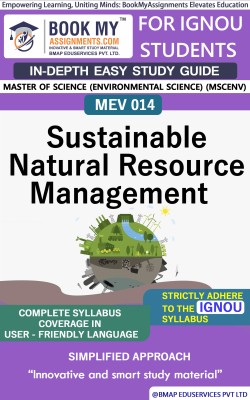IGNOU MEV 14 Sustainable Natural Resource Management Study Guide (In Depth Guide) for Ignou Student(Paperback, BMA Publication)
Quick Overview
Product Price Comparison
IGNOU's MEV 14 (Sustainable Natural Resource Management) course involves understanding the principles and practices of sustainable management of natural resources to ensure their long-term viability. Here's an in-depth guide to help you excel in your studies:Review the Syllabus: Start by thoroughly reviewing the syllabus provided by IGNOU for the MEV 14 course. This will outline the topics you need to cover and the structure of the course.Study Material: Utilize the study materials provided by IGNOU for the course. These materials typically cover fundamental concepts in sustainable natural resource management, including ecosystem services, conservation strategies, sustainable development principles, and community-based approaches.Textbooks and References: Supplement your study materials with textbooks and reference books on sustainable natural resource management. Some recommended textbooks include "Principles of Conservation Biology" by Martha J. Groom, "Sustainable Natural Resource Management: For Scientists and Engineers" by Daniel D. Chiras, and "Conservation Biology: Principles for Forested Landscapes" by William S. Keeton.Understanding Natural Resources: Sustainable natural resource management involves managing renewable and non-renewable resources such as forests, water bodies, fisheries, minerals, and wildlife. Understand the characteristics, distribution, and ecological functions of different natural resources.Ecosystem Services: Study the concept of ecosystem services and the benefits provided by natural ecosystems to human societies. Learn about provisioning, regulating, supporting, and cultural services and their importance for human well-being.Conservation Strategies: Explore different conservation strategies and approaches for protecting and managing natural resources sustainably. Study concepts such as protected areas, biodiversity corridors, habitat restoration, and species conservation.Sustainable Development Principles: Investigate principles of sustainable development and their application to natural resource management. Understand the triple bottom line approach, which considers economic, environmental, and social factors in decision-making.Community-Based Management: Explore community-based approaches to natural resource management, which involve local communities in decision-making processes and empower them to manage resources sustainably. Learn about participatory approaches, traditional ecological knowledge, and co-management arrangements.


